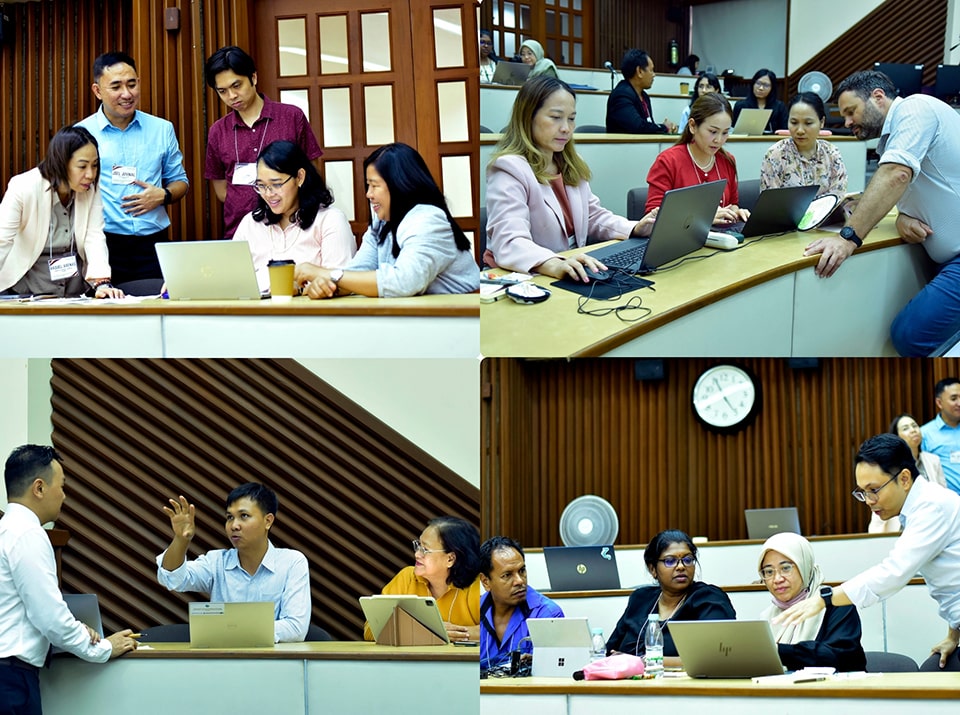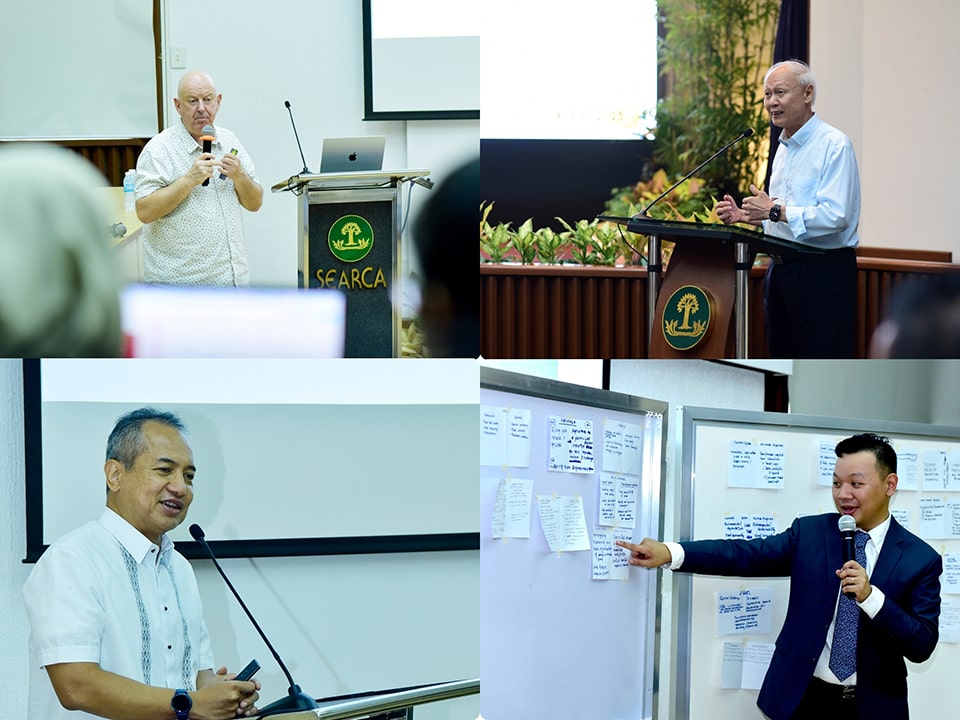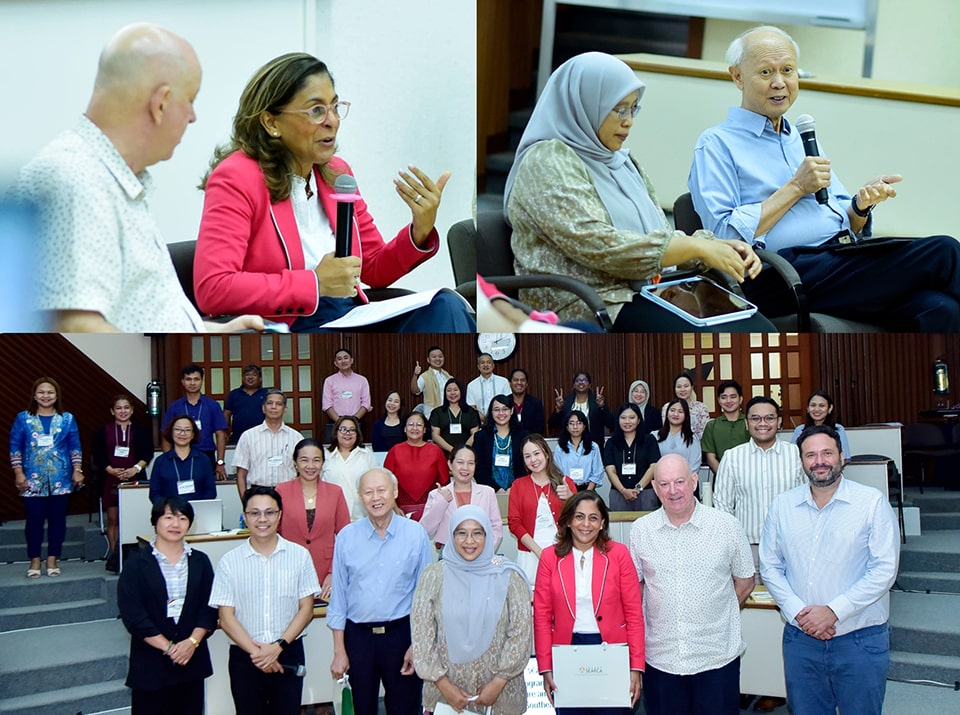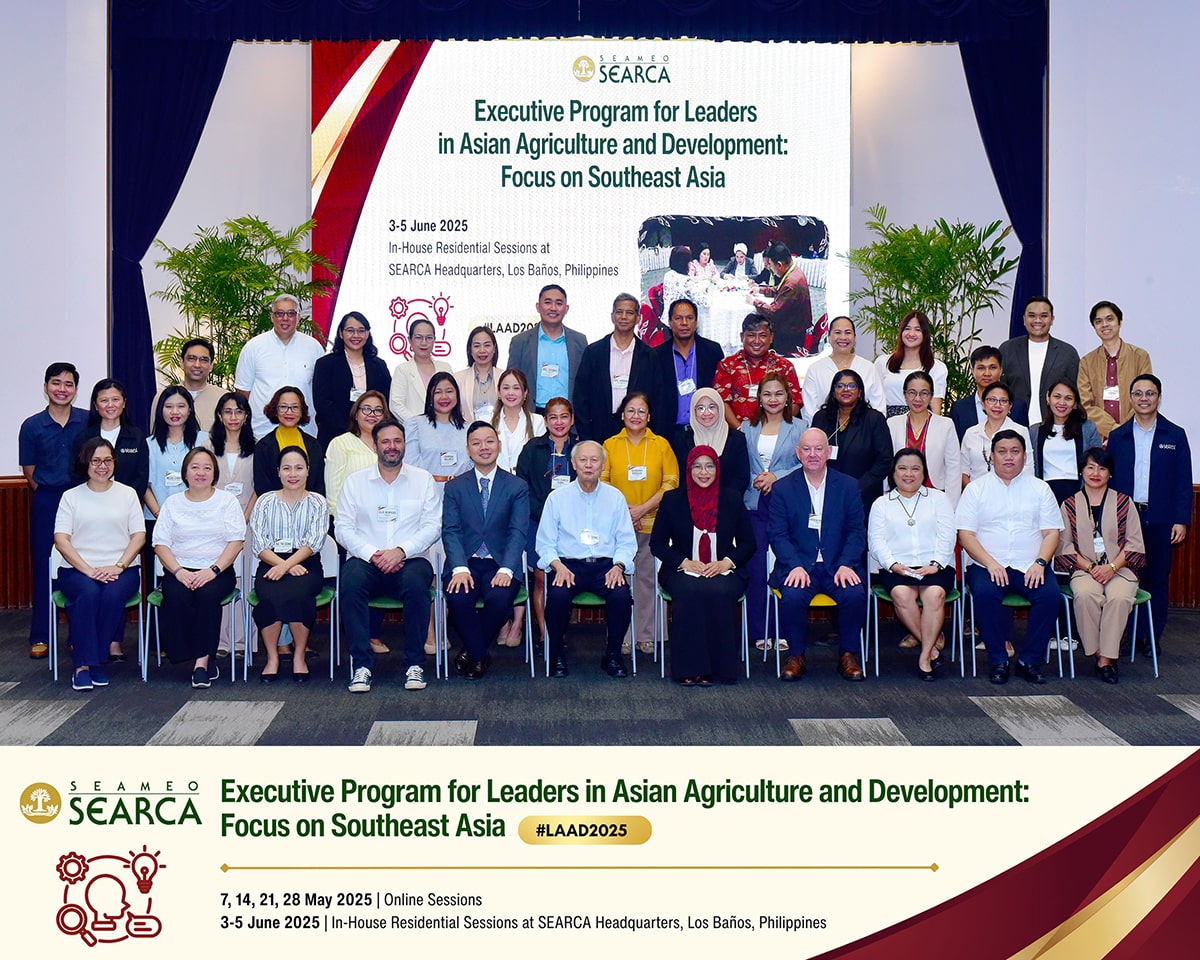 Agrifood system leaders from across Southeast Asia convened at SEARCA on 3-5 June 2025 for the in-house residential sessions of the LAAD program.
Agrifood system leaders from across Southeast Asia convened at SEARCA on 3-5 June 2025 for the in-house residential sessions of the LAAD program.
With the 2030 development agenda set to conclude in less than five years, the Southeast Asian Regional Center for Graduate Study and Research in Agriculture (SEARCA) reaffirmed its commitment to sustainable food systems transformation by training 27 leaders across seven countries in the region from 7 May to 5 June 2025.
The five-week Executive Program for Leaders in Asian Agriculture and Development (LAAD) brought together esteemed professionals in the agri-food sector from Cambodia, Indonesia, Malaysia, the Philippines, Thailand, Timor-Leste, and Vietnam. Focused on Southeast Asia, the LAAD enhanced the participants' knowledge of key regional issues in agriculture and food as well as their skills in strategic thinking and innovation.
According to LAAD Technical Director Professor Paul Teng, the primary goal of the hybrid leadership capacity development course is to build and mobilize an international community of changemakers in agriculture development through innovation. A SEARCA Senior fellow, Dr. Teng underscored the Center's strong alumni network is best positioned to capacitate future leaders of the agri-food sector.
"Our 12th five-year development plan will focus on transforming agriculture in the region through innovations. We encourage you not only to absorb the concepts but reflect on how you can lead and navigate positive changes in your communities," Dr. Nur Azura Binti Adam, SEARCA Deputy Director for Programs, said during the in-person session held at SEARCA on 3-5 June 2025.
Prior to the in-person sessions, participants completed 12 online modules between 7 and 28 May 2025. Topics covered included climate change, food security, future foods, regenerative agriculture, agri-food trade, biotechnology, urban agriculture, and decarbonization. Along with Dr. Teng, other experts who led the online sessions include Dr. Jose Ma Luis Montesclaros, Research Fellow at Nanyang Technological University in Singapore; Dr. Andrew Powell, CEO at Asia BioBusiness; Dr. Roehlano Briones, Senior Research Fellow, Philippine Institute for Development Studies; Dr. David Ng, Associate Professor, Policy, Curriculum and Leadership Academic Group, NTU; Dr. Rodel Lasco, Executive Director, Oscar M. Lopez Center; Dr. Rhodora Aldemita, Executive Director, ISAAA Inc.; and Ms. Marie Annette Dacul, Executive Director, UA&P Center for Food and Agri Business.
 Thought leaders in the agri-food sector provided lectures and workshops for the 27 LAAD participants. (Clockwise from top left): Dr. Andrew Powell, Dr. Paul Teng, Dr. Jose Ma Luis Montesclaros, and Dr. Roehlano Briones.
Thought leaders in the agri-food sector provided lectures and workshops for the 27 LAAD participants. (Clockwise from top left): Dr. Andrew Powell, Dr. Paul Teng, Dr. Jose Ma Luis Montesclaros, and Dr. Roehlano Briones.
Leadership under change
With global and local crises becoming a real turning point for change, LAAD featured a four-panel discussion directly from leaders in the field who have navigated changes in a constantly evolving agri-food landscape.
International Rice Research Institute's Director General Yvonne Pinto joined Dr. Teng and Dr. Adam in the panel. She stressed that leaders and organizations must be adaptive, resilient, and forward-looking to implement change that resonates and sustains amid geopolitical shifts and climate change impacts.
"In terms of navigating change, it was very much about a new strategy. We call it a 10-year vision. That's the kind of ambition we should be having," the first woman IRRI chief said.
"We model leadership behaviors around collaboration, respect, and shared success. When we developed our strategy, we consulted 20 countries and we created change champions across organizations and we took feedback from them," Dr. Pinto added.
 The panel on leadership and change provided insights and inspiration on navigating organizational changes and the competencies needed for leading such changes.
The panel on leadership and change provided insights and inspiration on navigating organizational changes and the competencies needed for leading such changes.
While transformation demands enabling policies, Dr. Nur maintained that leaders need to be consciously inclusive during periods of transition, citing SEARCA's experience during the COVID-19 pandemic.
As the recent global crisis ushered in a new era of agriculture, SEARCA responded by leading initiatives that not only train future leaders but, more importantly, spark greater interest in agriculture among the youth.
"Agriculture is part of life, so changes are more personal. You must have inclusivity to ensure that change is reliable and sustainable. It doesn't need to be high tech all the time, just as long as it works," Dr. Nur said.
Futuring Project
The executive program culminated with a "futuring" project presentation from each institution covering topics that include carbon emissions, farmer resilience, community and social services, food loss, education, and youth empowerment.
The projects aimed to propose transformational changes through the adoption or development of new technologies or through a new strategic direction or organizational change. In one project focused on collective agripreneurship for smallholder farmers, a team of five professionals from the Philippines and Indonesia aimed to create ripples of change across social, economic, environmental, and policy spheres. They emphasized the need for farmer-friendly policies at local, national, and international levels that support agri-entrepreneurship and institutionalize an agri-cluster approach.
Dr. Raquel Santiago-Arenas, Vice Chancellor for Research and Extension, Mindanao State University in Maguindanao, Philippines, shared that empathy is critical when working with farmers, especially women farmers who continue to confront security challenges.
"Empathy is very important. They need to know that the government really cares for them to trust you because there has been mistrust for a long time," she said, noting her one-year experience working with women-led cooperatives in the southernmost part of Mindanao.
"When you give them the role and voice to be leaders, they will be the ones to lead change in their communities" Dr. Santiago-Arenas asserted.
At the program's closing session, Ms. Na Thi Dong from Vietnam conveyed her gratitude, emphasizing how the leadership course challenged her to engage in more active and strategic thinking while providing timely insights for her work in the multi-donor funded Agroecology and Safe Food System Transitions Project.
"I realized the importance of experience sharing and mutual learning across ASEAN countries. We also recognize the need to adapt leadership approaches that are appropriate to each unique context," she shared.
This LAAD is the sixth installment of SEARCA's executive leadership program, which was first offered in 2013. Since then, over 100 leaders across Southeast Asia have been trained and remain actively involved in shaping the agri-food landscape in the region.
